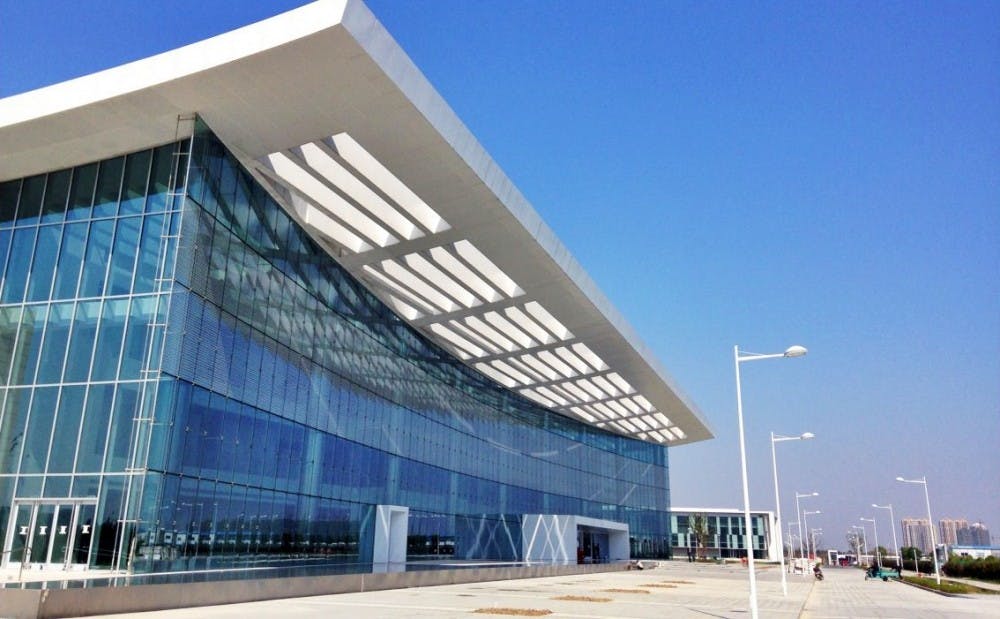This guest column aims to raise points of clarification to help the Duke community better understand and discuss Xinjiang’s “re-education camp” and its implications to DKU’s development as raised in last Friday's Chronicle editorial “Caution for Kunshan.”
The editorial begins by pointing out that “the East Turkestan region is officially referred to as Xinjiang province by CCP leadership in an effort to strip the region of its ethnic identity.” It is notable that the full name of the Xinjiang province is Xinjiang Uyghur Autonomous Region, which, at the very minimum, suggests a recognition of ethnic identity. The name “Xinjiang” (literally “New Frontier”) has been in use since around 1760, and has been established as a Chinese province since 1884, during the Qing dynasty. Despite the literal meaning of the name, the territory has been under Chinese jurisdiction since earlier dynasties, just not as a province. In general, the name Xinjiang has historical roots, and it is a stretch to claim it as a CCP effort of ethnic control.
On the other hand, the name of “East Turkestan” started to be commonly used by Uyghurs since the 1930s, which may be influenced by the two movements aiming to create an “East Turkestan” republic in 1933 and 1944. It is also notable that the short-lived second East Turkestan republic, backed by the Soviet Union, is a clear example of how an ethnic group was used as a bargaining chip in the game of international politics. The Treaty of Friendship and Alliance signed by the Nationalist Government of the Republic of China and the Soviet Union at the Yalta conference finally ended overt Soviet support for the East Turkestan Republic. The Treaty, under the consent and support of the US and the UK, put nation-building possibilities for the ETR out of the question.
Finally, the editorial references a deduction of “social credit” score for people of Uyghur ethnicity. There is currently no report of a “social credit” score that takes Uyghur ethnicity into consideration. The relevant source from an opinion article on the New York Times actually claims it as a system for security organs to assess security risk posed by residents. While it is hard to determine whether ethnic profiling is at play, it is not unreasonable for the Chinese government to have such security concerns over the region: there have been past terrorist incidents and bloody riots including the blowing up of the warehouse of the Urumqi Train Station in 1998, the 2009 Urumqi attacks, the 2014 Kunming attack, and the July 2009 Urumqi riots. The Eastern Turkistan Islamic Movement, active in the Xinjiang region, has been designated as a terrorist organization by the UN Security Council since 2002. The ETIM has received significant support from Al-Qaida and the Taliban.
It may be too quick to conclude that what is going on in Xinjing as solely “an unprecedented tumult and oppression.” When taking into consideration the region’s complicated history ranging from ethnic conflicts, international politics, religious differences, to extremism and many other factors, there is no doubt that Xinjing is a troubled region that warrants not only sympathy and concern, but also caution on the policy level. The complicated causes of today’s tragedy strengthen the call for more comprehensive and humanitarian solutions.
When examining concerns over Duke Kunshan University, it is indeed important for Duke to be mindful of the university’s values and be aware of ethnic tensions in China, amongst other political issues. However, choosing to divest in tough and complex situations is not necessarily a more moral action than attempts at engagement.
Back in the Qing Dynasty, when China was much more closed-off than it is today, American churches sponsored and established schools that served as windows between China and the rest of the world. Despite widespread anti-foreign sentiments in China at that time, these foreign-sponsored schools played a key role in promoting the modernization of Chinese education and society. Some Christian schools established in the early twentieth century, for example, became the first women's colleges in China, and a few of them, such as Ginling College, evolved into renowned universities in China today.
With all the differences in culture and ideology, and amidst the multidimensional tension between U.S. and China today, there is a natural tendency towards caution, isolation and disengagement. But it is for these exact reasons that DKU has a critical role to play. It is easy to disassociate oneself from the problems, but having a presence in China gives Duke some unique and valuable capacity to confront the complex challenges in the Chinese society and in U.S.-China relations with understanding and determination.
William Chang and Cindy Wang Trinity sophomores. Cecilia Wu is a Trinity junior.
Get The Chronicle straight to your inbox
Sign up for our weekly newsletter. Cancel at any time.

